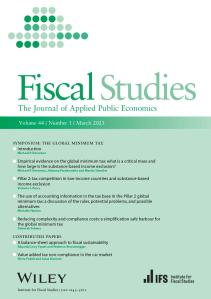<p><p>Tax systems are generally not designed so much as developed over the years in an incremental way. The review of Australia's future tax system currently under discussion under the chairmanship of Dr Ken Henry (the Henry Review) offers an opportunity to look at the system holistically and to examine fundamentals.</p><p>Rather than designing a tax system that suits large business and then considering carve outs and concessions for small firms, such a review needs to think about small businesses as part of the initial design of the whole system. The 'think small first principle' that requires policy-makers to take into account the needs of small businesses at an early stage of policy making is now widely accepted. In the Mirrlees Review undertaken by the Institute for Fiscal Studies, small businesses were dealt with in a special study (of which the current author is a co-author), but, as is apparent from some of the key chapters on corporation tax and international issues, it was recognised by those working on corporation tax more generally that there is a need to deal with the structural issues of small business taxation as part of the fundamental design of the system and not simply as an add on or a carve out.</p><p>How small businesses should be tackled within tax system design depends very much on the objectives of the design overall. Much of the discussion in the chapter written for the Mirrlees Review and in this paper arises from developments and pressures within Europe. It will be for Dr Henry, his team and those whom they consult to determine the extent to which these pressures and movements are relevant to Australia. Thus, this paper does not presume to make proposals for Australia but is offered as a contribution to the debate.</p></p>







